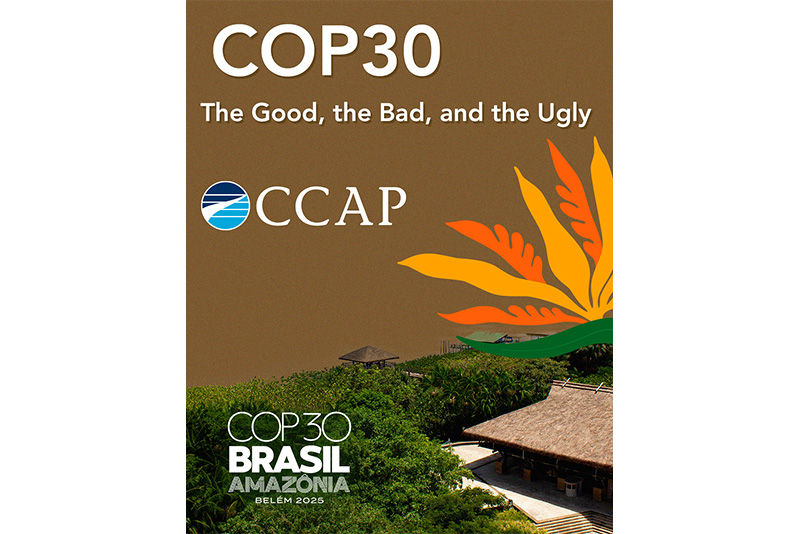Tracking Finance Flows Is Essential to Addressing Climate Change
- Stacey Davis
- Aug 13, 2020
- 3 min read
Updated: Jan 28, 2021
As the international community works to strengthen the global response to climate change, there is a strong recognition that choices on how funds are invested will be critical to whether or not we will be successful in “stabiliz[ing] greenhouse gas concentrations in the atmosphere at a level that would prevent dangerous anthropogenic interference with the climate system,” as called for by the United Nations Framework Convention on Climate Change (UNFCCC).
Accordingly, Section 2.1c of the Paris Agreement aims to: Mak[e] finance flows consistent with a pathway towards low greenhouse gas emissions and climate-resilient development. Likewise, under the Cancun Agreements in 2010, recognizing developing countries could not meet their mitigation and adaptation goals independently, developed countries committed to a goal of jointly mobilizing USD 100 billion per year by 2020 to meet the finance needs of developing countries. These funds would come from a combination of public and private, bilateral and multilateral sources. Work is expected to begin at COP26 in Glasgow towards a new goal by 2025 that will increase the developed country commitment to international financial support.
Assessing progress towards these financial goals requires systematic and consistent tracking of international investments, both public and private, to know whether 1) investments are consistent with low-emission outcomes and 2) sufficient investments are being mobilized to foster mitigation and/or adaptation in developing countries towards the USD 100 billion annual goal.
Existing reporting and tracking initiatives such as those by the UNFCCC, the Organization for Economic Cooperation and Development (OECD), and collaborative work among Multilateral Development Banks (MDBs) paint a reasonably reliable picture of public finance flows. This contrasts markedly with the limited understanding of private flows.
Challenges in Tracking Private Climate Finance
As discussed in CCAP’s paper, Understanding the Estimation and Tracking of Private Climate Finance, there are problems with insufficient and inconsistent reporting of private sector investments. Key points are as follows:
The Bloomberg New Energy Finance provides an essential and widely used source of data on private sector investments in renewable energy. However, similar reports do not yet exist for other sectors of the economy critical to low-carbon, climate-resilient development (e.g., agriculture, industry, waste). Further, some sectors may be harder to evaluate (e.g., building efficiency, adaptation) because the low-carbon investment is typically just a component of a larger project.
There are a number of decisions to be made on how to “count” private sector investments, and different choices can impact the comparability of results. For example:
What are the rules for deciding whether an investment is climate finance? Does efficient fossil generation “count” as climate finance?
For a project with multiple components, does the entire investment “count” as climate finance, or just the portion identified as the low-carbon investment?
For a private investor operating out of multiple jurisdictions, how to properly assign the jurisdiction to know whether it can be attributed to the $100 billion commitment?
Are mobilized private investments stemming from blended finance attributed to a single public investor (e.g., a multi-lateral development bank), or shared across the various public investors that contributed to the project?
Private companies may not report low-carbon investments due to concerns about the disclosure of confidential business information.
Recommendations
To improve tracking of private sector low-carbon investments mobilized by public entities, it will be critical to improve consistency across the various entities reporting these investments. The use of different rules and definitions currently reduces comparability. In addition, new systems under development by the UNFCCC should establish clear and consistent reporting rules and guidelines for countries and partners to follow.
At the same time, it will be important to step up direct “bottom-up” reporting from the private sector as well as “top-down” estimates of private sector investments at a sector scale. The private sector risk reporting framework advanced by the Task Force for Climate-Related Financial Disclosure offers an important model for company-specific reports, recognizing that data on low-carbon investments may need to be shared on an aggregated basis to avoid disclosure of confidential business information. Likewise, the EIA’s methods to estimate private investments in efficiency (incremental to standards and market averages) and electric vehicles (incremental to public incentives) could be replicated in other sectors.
Next Steps
Comprehensive and consistent tracking of private financial flows will be critical to global efforts to realize higher climate ambition; CCAP will continue to follow and report on important developments in this active area of inquiry.





شيخ روحاني
رقم شيخ روحاني
الشيخ الروحاني
الشيخ الروحاني
شيخ روحاني سعودي
رقم شيخ روحاني
شيخ روحاني مضمون
Berlinintim
Berlin Intim
جلب الحبيب
https://www.eljnoub.com/
https://hurenberlin.com/